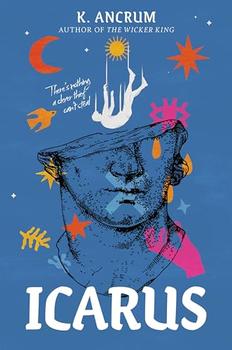Summary | Excerpt | Reviews | Beyond the Book | Readalikes | Genres & Themes | Author Bio

 Book Reviewed by:
Book Reviewed by:
Isabella Zhou
Buy This Book
Excerpt
Icarus
wednesday
It was dark in this house.
The air was still and warm.
Cat burglars rarely wear shoes. Instead, they wear socks. Icarus's were old and wool and his father had hand sewn fine black leather to the bottoms for traction.
Icarus crept across the edge of the main hall, then slipped into a drawing room.
Mr. Black's house had many useless spaces, many alcoves filled with junk. It was a monstrosity of metal and wood. Icarus had been here thousands of times over the years and he never felt comfortable. It was not a home; it was as empty and lifeless as a dollhouse.
Above a desk—protected from light and dust by a thin sheet—was Warhol's Red Lenin.
Icarus scanned the area around the painting, searching for the glint of a camera lens. He checked every time, like each visit was the first. It wasn't good to get too comfortable. Icarus crossed the room quickly and began dismantling the installation. He placed small tacks and screws on the floor, turned the protective glass pane onto its inside face to avoid disturbing the dust on the front. Then, Icarus pulled the black, flat case he carried off his back and unpacked his father's work: Warhol's Red Lenin.
It wasn't an expensive print, but Mr. Black was familiar with his belongings. He knew the works in this home. But Icarus's father knew Mr. Black and that made all the difference.
Icarus framed the forgery and hung it on the wall. He packaged the original painting and slid it into his carrying case. He backed out of the room, stepping into his own impressions, brushing back against the grain to erase his footprints. Then, he pulled the door softly closed.
Icarus left the house, scurried over the fence, shoved his feet into his Chelsea boots, and walked quickly home
icarus filiformis
Icarus was his father's son.
They were of a height, they had the same wiry frame, the same limp black hair, the same big ears, the same deep-set brown eyes, the same unhappy mouth. Icarus thought his father was ugly, so he knew he must be ugly too.
They were both artists, though Icarus was slightly worse.
Both thieves, but Icarus was faster.
Both quiet, but Icarus knew how to talk to other people.
Both friendless, but Icarus knew how to make people like him.
They walked at the same pace, moved with the same grace, had the same size hands and similar handwriting.
They both kneeled in penance, chins to the sky, fisted rosary. His father liked to keep his eyes closed. Icarus needed to keep his eyes open to stay tethered to faith.
And wasn't that just the way?
Angus Gallagher shut tight like a sarcophagus. Icarus Gallagher, eyes open, mouth open, waiting
Bounty
Icarus and his father lived in a small apartment in a part of town that had been nice maybe forty years ago.
The inside of their home smelled strongly of wood, linseed, minerals, herbs, and canvas, so that's what Icarus smelled like too.
The lights were all dim specialized bulbs designed to reduce light damage to paint. There were landscapes and portraits, repeated theme. A woman in green, brushed over and over, smiling, laughing, lying among them, her face an open secret. The only room where the walls weren't dotted with paint or paintings was the kitchen. In that room, where the sun was brightest, there were ferns in every corner that could house one.
In a few years, when Icarus and his father didn't live there anymore, a little girl from the new family who moved in would tell her parents there was gold dust in the cracks of the wood, gold left over from years of gilding.
They wouldn't believe her.
It was an artist's house. A studio with beds. Crammed full to bursting
him
Icarus slipped in and closed the door.
Excerpted from Icarus by K. Ancrum. Copyright © 2024 by K. Ancrum. Excerpted by permission of HarperTeen. All rights reserved. No part of this excerpt may be reproduced or reprinted without permission in writing from the publisher.





The House on Biscayne Bay
by Chanel Cleeton
As death stalks a gothic mansion in Miami, the lives of two women intertwine as the past and present collide.

The Flower Sisters
by Michelle Collins Anderson
From the new Fannie Flagg of the Ozarks, a richly-woven story of family, forgiveness, and reinvention.

The Funeral Cryer by Wenyan Lu
Debut novelist Wenyan Lu brings us this witty yet profound story about one woman's midlife reawakening in contemporary rural China.
Your guide toexceptional books
BookBrowse seeks out and recommends the best in contemporary fiction and nonfiction—books that not only engage and entertain but also deepen our understanding of ourselves and the world around us.